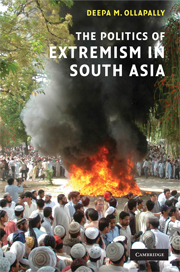Book contents
- Frontmatter
- Contents
- Acknowledgements
- Map of South Asia
- 1 Introduction: beyond and before the 9/11 framework
- 2 Situating violent conflict in South Asia
- 3 Afghanistan's changing fortunes
- 4 Pakistan at the crossroads
- 5 Conflict and contradiction in Kashmir
- 6 Sri Lanka's violent spiral
- 7 Bangladesh: divided politics and geopolitics
- 8 Conclusion
- Bibliography
- Index
8 - Conclusion
Published online by Cambridge University Press: 05 September 2012
- Frontmatter
- Contents
- Acknowledgements
- Map of South Asia
- 1 Introduction: beyond and before the 9/11 framework
- 2 Situating violent conflict in South Asia
- 3 Afghanistan's changing fortunes
- 4 Pakistan at the crossroads
- 5 Conflict and contradiction in Kashmir
- 6 Sri Lanka's violent spiral
- 7 Bangladesh: divided politics and geopolitics
- 8 Conclusion
- Bibliography
- Index
Summary
The proposition that equates extremism and terrorism with ethnic and religious factors is easy to make, but harder to prove, as evidence from these cases reveal. The region's long socio-political history is revealing in its absence of strong religious identity constructions prior to the colonial period. Remarkably, this was the situation even on the eve of independence during the 1940s. But by then, conditions had already been laid for what was to become a three-way struggle in contemporary South Asia between ethno-religious, secular and geopolitical identities.
How this interaction unfolds significantly explains the key puzzles that animate the book. What accounts for the rise of extremist ethno-religious groups in societies that were historically not so predisposed? How do we account for the wide variation in ethnic and religious ideology, political strategy and the foreign-policy orientations of political groups? Most importantly, what determines the winners and losers in the overarching identity struggles that we see in South Asia and what tips the balance between more moderate and extremist outcomes?
Internal–external links
As Chapter One shows, the literature on the politics of ethnicity and religion is vast but inconclusive. I argue for the addition of another variable, the geopolitics of ethno-religious identity (or what I term geopolitical identity) that influences, and at times even determines, the trajectory of extremism in South Asia. The role of the state is critical in fashioning geopolitical identities that bring together external foreign policy considerations and internal power-seeking objectives.
- Type
- Chapter
- Information
- The Politics of Extremism in South Asia , pp. 209 - 218Publisher: Cambridge University PressPrint publication year: 2008



